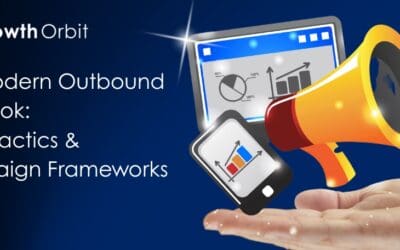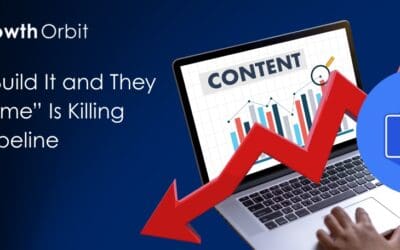Why sales development programs fail. #4 Lead follow up.
Growth Orbit Insights
In the previous three parts of this series on why sales development programs fail, we discussed the need for you and your team to be fully committed to the success of your lead generation programs as well as ensuring that you have high quality data. We then explored the need for structure, technology, and training of your sales team. For your sales development program to succeed there must be a legitimate, consistent effort to work the leads passed to sales.
In this final part of the series we will provide suggestions on how to foster an accountable environment so that your sales development program won’t fail due to lack of follow through.
by Steve Schilling
Your sales development program will fail if the leads are not called
Failure by the sales force to follow up on leads: This reason that sales development programs don’t succeed is the one that surprises us the most—and we see it all the time. While not excusable, it’s understandable why it’s a failure factor that’s too common.
In most organizations, sales reps have been conditioned to dismiss leads passed from marketing and most other sources. Typically, this is because the vast majority of leads they receive aren’t qualified, are missing necessary information, and generally tend to be a waste of time.
When new sales development programs are implemented, there’s usually little reason for the sales organization to expect anything different. And since they don’t expect much, their follow up to newly generated leads is often lacking.
A well-structured lead development effort includes a clearly defined lead definition and a documented process to capture opportunity details. The hand-off includes a write up (properly loaded into a CRM) and a recording of the call(s) that generated the lead. This information provides what’s needed for the receiving salesperson to prepare for the upcoming meeting.
Preparation is critical
Related to failure to follow-up is failure of the sales force to prepare for follow-up calls. While most salespeople wouldn’t walk into a job interview unprepared, many believe they can meet a potential customer without doing their homework, and it shows. And to make matters worse, all too often, the prospect has likely planned what they want to discuss with the sales person on the other end of the line.
This is the age of the internet, and salespeople have no excuse for not doing their homework and being prepared to provide value to a prospect. When a lead is handled carelessly, after sales development has set the opportunity in motion, it’s discouraging to those on the front lines. Then, the cycle continues, and programs backfire.
Put an SLA in place
An effective sales development effort includes a service level agreement (SLA) between sales development and sales. The SLA defines what constitutes a qualified lead, how follow up or discovery meetings are scheduled, what information is gathered and provided to sales, and how that handoff happens. In return, the SLA sets expectations for the salesperson’s prep work before the meeting, defines their role, and details the type of feedback they’ll need to provide to sales development.

Having an SLA assures no good lead (and the resources used to generate it) is wasted. The lead is either sent back to sales lead development to continue to be worked, or it’s accepted by sales to follow up on. It’s never allowed to flounder with no one shepherding it through appropriate channels.
Establish the right ground rules from the beginning, open up appropriate lines of communication, and you will ensure your lead development effort is positioned for long-term success.
Part 4 of 4
This is the last of a four-part blog series covering the top reasons lead development programs fail. The blog series is excerpted from Growth Orbit’s new eBook: 4 Reasons Why Sales Development Programs Fail (And What You Can Do About It).
About Growth Orbit
Growth Orbit is a full-service growth acceleration firm, focused on driving measurable value through growth initiatives that work. We excel at combining sound growth strategy with proven sales methodologies, supported by effective technology. We only consider ourselves successful when we deliver accelerated, measurable growth for our clients.
From developing smart insight driven sales messaging, to filling your funnel with qualified leads, we’ve built our foundation on meeting clients where they are and helping them achieve new levels of growth — what we call reaching Growth Orbit!




